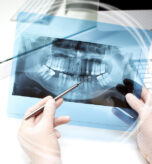Introduction
Wisdom tooth extraction is a common dental procedure that many people will experience at some point in their lives. While the idea of having a tooth removed might seem daunting, understanding the process, knowing what to expect, and recognizing when it’s necessary can help ease any anxiety. In this comprehensive guide, we’ll walk you through everything you need to know about wisdom tooth extraction, from the initial consultation to recovery, so you can be well-prepared if the time comes.
What Are Wisdom Teeth?
Wisdom teeth, also known as third molars, are the last set of teeth to emerge, typically appearing between the ages of 17 and 25. While some people may have enough space in their mouths to accommodate these teeth, others may not, leading to a variety of dental issues. Problems with wisdom teeth arise when they become impacted, which means they are unable to fully emerge due to a lack of space or because they are growing at an awkward angle.
Why Do Wisdom Teeth Cause Problems?
The primary issue with wisdom teeth is that they often do not have enough room to grow properly. This can lead to impaction, where the tooth is trapped under the gum line or is pushing against adjacent teeth. Impacted wisdom teeth can cause pain, swelling, infection, and damage to other teeth. In some cases, cysts may form around the impacted tooth, which can lead to more serious complications such as bone loss or damage to the jaw.
Signs You Need a Wisdom Tooth Extraction
It’s not always easy to know when wisdom teeth need to be removed, as they don’t always cause noticeable symptoms. However, there are several signs to watch out for that may indicate the need for extraction.
Common Symptoms
- Pain and Swelling: One of the most common signs that your wisdom teeth need attention is pain at the back of your mouth. This pain can be persistent or come and go, and it may be accompanied by swelling in the gums or jaw.
- Infection: Impacted wisdom teeth are prone to infections, which can manifest as redness, tenderness, or discharge from the gums. This infection can spread to other areas of the mouth if not treated promptly.
- Difficulty Opening Your Mouth: If you find it difficult to open your mouth fully or experience discomfort when doing so, this could be a sign that your wisdom teeth are causing problems.
- Misalignment: As wisdom teeth push against other teeth, they can cause misalignment, leading to issues with your bite or making it difficult to clean your teeth properly.
Dental Examination
Regular dental check-ups are crucial for monitoring the development of wisdom teeth. Your dentist will use X-rays to assess the position of the teeth and determine whether they are likely to cause problems. If there’s any concern, your dentist may recommend extraction even before symptoms appear to prevent future issues.
The Wisdom Tooth Extraction Procedure
If your dentist recommends wisdom tooth extraction, understanding the procedure can help alleviate any fears. While the process may vary slightly depending on the complexity of the case, most extractions follow a similar pattern.
Pre-Procedure Consultation
Before the extraction, you’ll have a consultation with your dentist or oral surgeon. This is an opportunity to discuss your medical history, medications you’re taking, and any concerns you have. Your dentist will explain the procedure, including what to expect during and after the extraction.
The Extraction Process
- Anesthesia: The procedure typically begins with the administration of local anesthesia to numb the area around the tooth. If you’re particularly anxious, sedation may also be offered to help you relax.
- Removing the Tooth: Once the area is numb, the dentist will make an incision in the gum tissue to expose the tooth and bone. If the tooth is impacted, it may need to be broken into smaller pieces to make removal easier.
- Stitches and Gauze: After the tooth is removed, the dentist will clean the site and may place stitches to promote healing. Gauze will be placed over the extraction site to control bleeding.
Wisdom tooth extraction procedure time
The duration of the procedure can vary depending on the complexity, but most extractions take less than an hour to complete. Simpler cases where the tooth has fully erupted may take just a few minutes, while more complex extractions involving impacted teeth may take longer.
wisdom tooth Post-Extraction Care
Proper aftercare is essential for a smooth recovery following wisdom tooth extraction. Your dentist will provide you with detailed instructions on how to care for your mouth in the days following the procedure.
Dos and Don’ts
- Rest: It’s important to rest for at least 24 hours after the extraction. Avoid strenuous activity, as this can increase bleeding and delay healing.
- Diet: Stick to soft foods like yogurt, mashed potatoes, and soup for the first few days. Avoid chewing near the extraction site and refrain from eating hard, crunchy, or sticky foods.
- Oral Hygiene: While it’s important to keep your mouth clean, be gentle around the extraction site. You can rinse your mouth with warm salt water, but avoid using mouthwash with alcohol as it can irritate the area. Brush and floss your other teeth as usual, but be careful around the extraction site.
- Pain Management: Over-the-counter pain relievers can help manage discomfort. In some cases, your dentist may prescribe stronger pain medication. Applying an ice pack to the outside of your cheek can also help reduce swelling.
- Avoid Smoking and Drinking Alcohol: Smoking can delay healing and increase the risk of complications such as dry socket. It’s best to avoid smoking and alcohol for at least a few days after the procedure.
What to Watch For
While some discomfort and swelling are normal after wisdom tooth extraction, it’s important to monitor your recovery and contact your dentist if you experience any of the following:
- Severe Pain: If your pain is not relieved by medication or seems to be getting worse, this could be a sign of dry socket, a condition where the blood clot at the extraction site becomes dislodged.
- Excessive Bleeding: Some bleeding is normal, but if it persists for more than 24 hours or is heavy, contact your dentist.
- Fever or Infection: If you develop a fever, experience intense swelling, or notice pus coming from the extraction site, these could be signs of infection that require prompt treatment.
What Happens After Healing from wisdom tooth extraction
Once your mouth has healed, it’s important to continue practicing good oral hygiene and attend regular dental check-ups. Your dentist will monitor the extraction site during these visits to ensure there are no long-term complications.
-
Replacement Options
In some cases, if a wisdom tooth was extracted from a visible part of the mouth, you may want to consider a dental implant or bridge to fill the gap. Your dentist can discuss the best options for your situation.
Final Thoughts
Wisdom tooth extraction, while common, is a significant procedure that requires careful consideration and planning. If you’re experiencing symptoms of impacted wisdom teeth or your dentist recommends extraction, don’t delay in seeking treatment. With the right care and attention, you can ensure a smooth recovery and maintain your oral health for years to come.
Oval Dental Clinic where Pain Ends and Smiles Begin!
At Oval Dental Clinic, we understand that wisdom tooth extraction is a significant decision that requires expert care. Our top-tier dental team in Dubai is committed to providing you with the highest level of oral surgery, including wisdom tooth extraction, ensuring a smooth and pain-free experience. Whether you need dental implants, braces, teeth whitening, Hollywood smiles, or dental crowns and bridges, our state-of-the-art clinic is here to support your journey to optimal oral health. Don’t let wisdom tooth pain disrupt your life—schedule your consultation today and take the first step towards a healthier, brighter smile. Contact us now to book your appointment!






